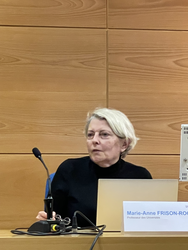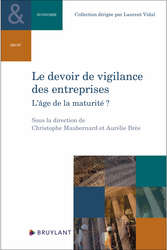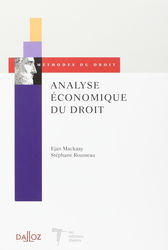Jan. 29, 2026
Conferences

🌐Follow Marie-Anne Frison-Roche on LinkedIn
🌐Subscribe to the Newsletter MAFR Regulation, Compliance, Law
🌐Subscribe to the video newsletter MAFR Overhang
🌐Subscribe to the Newsletter MaFR Law & Art
____
► Full reference : M.-A. Frison-Roche, "Le Droit de la Compliance, voie de la transition vers une égalité effective, efficace et efficiente entre les êtres humains (Compliance Law, for the transition towards the effectiveness, efficacy and efficiency of the equality between human beings)", in Chair "Mutualist and cooperative banking at the service of the economy", ESCP, Les banques coopératives et les transitions (Cooperative Banks and Transitions), 29 January 2026.
____
🧮view the general programme for the conference Cooperative banks and transitions (in French)
____
📶see the slides (in French)
____
► Presentation of this conference: The conference is not specifically aimed at lawyers, and even less so at specialists in Compliance Law. That is why it is divided into three parts, in order to show how Compliance Law is relevant in practice for creating effective, efficace and efficient equality between human beings.
The first part of the lecture sets out the ambition of equality between human beings. As this is a political principle and not a natural one. As it is an ambition, it justifies being placed first and after that this ambition must be concretised, in a sort of second place. This second place is built bay a tro : that of effectiveness (real application of the norm), efficacy (that the goal for which the norm was established is achieved) and efficiency (that the system is transformed so that, having become robust, it endures through sustainabily).
The second part of the conference will present the new branch of law known as Compliance Law. This should be distinguished from simple conformity, which consists of mechanically obeying a body of regulations that are constantly growing and becoming more complex. Compliance Law's Goal is to protect systems from risks that could cause them to disappear (all systems). "Sustainability" is the key principle, which is not limited to the climatic system (also digital system, banking system, and so on) and imposes the future as its object and the long term as its relevant time frame (unlike the market and Competition Law). "Transition" is also a key concept, as it involves moving from one state to another, from an expressed ambition to its realisation, through collaboration with others. These Goals are "Monumental" and are the normative legal basis of Compliance Law. In Europe, the Compliance Monumental Goal is to preserve systems for that the human beings who are involved in them, willingly or unwillingly, are not crushed by them, but rather benefit from them (for instance in banking sector). This is a "Monumental Negative Goal", to which is added a "Monumental Positive Goal", which a new conception of the "Ex Ante Responsability" (not liabily).
Dialectically, the third part of the conference explains how Compliance Law internalises the political ambition of equality between human beings, which develops in the three concentric circles of effectiveness, efficacy and efficiency, among the operators best placed to contribute to it.
Mutual banks belong to these circles more than the others. Firstly, because they are structured around the principle of taking human beings into consideration. Secondly, because they are rooted in their local areas. Thirdly, because they are driven by the long term, duration and sustainable. The transition est easer. The dificulty is the necessity to proof the effective and efficient will to do this transition.
____
⛏️Go further :
🕴🏻M.-A. Frison-Roche, 📝Drawing the circles of Compliance Law, 2017
🕴🏻M.-A. Frison-Roche, 📝Monumental goals, the beating heart of compliance law, 2021
🕴🏻C. Peicuti and 🕴🏻J. Beyssade, 📝The feminisation of management positions in companies as a compliance objective. The example of the banking sector, in 🕴🏻M. -A. Frison-Roche, 📘The Monumental Goals of Compliance, 2022
🕴🏻M.-A. Frison-Roche, 📝Births of a New Branch of Law: Compliance Law, 2024
________
Oct. 16, 2025
Publications
🌐Follow Marie-Anne Frison-Roche on LinkedIn
🌐Subscribe to the Newsletter MAFR Regulation, Compliance, Law
🌐Subscribe to the video newsletter MAFR Overhang
🌐Subscribe to the Newsletter MaFR Law & Art
____
► Full reference : M.-A. Frison-Roche, "De l'obligation de compliance à l'obligation de vigilance : le rôle du juge (From the obligation of compliance to the obligation of vigilance: the role of the judge)", in Round table De la compliance au devoir de vigilance. Une nouvelle responsabilité des entreprises (From Compliance to the Vigilance duty. A new responsibility for businesses," Lettre des juristes d'affaires, Oct. 2025.
____
📝read the article reproducing the entire discussion (in French)
____
► Summary of my contribution: In this debate, the terms of which have been reproduced in the journal, I was asked to explain how the legal system had evolved, first by establishing Compliance Law, built on systemic ambitions to prevent sectoral disasters (banking, finance, energy), ambitions that constitute "Monumental Negative Goals", and then evolving on the one hand "Monumental Positive Goals", namely the protection of human beings involved willingly or unwillingly in these systems, on the other hand, outside even sectors with clearly defined boundaries, such as environmental or digital ambitions. The duty of vigilance extends this regulatory law and gives concrete form to the "compliance obligation" to which companies are subject. It is important to maintain a sense of proportion in the conception of the responsibility attached to it so as not to lose everything. Companies are bound by the goals but must remain free in their choice of means, and in particular be encouraged to use contractual techniques. This measure is entrusted to the judge because, due to the Compliance Jurisdictionalisation, it is at the heart of this new branch of Law, which is developing independently of fluctuations in the regulations.
During the discussion, I was asked for my opinion on the ruling handed down by the Paris Court of Appeal on 17 June 2025, known as La Poste case. I pointed out that the comments had often focused only on the developments regarding risk mapping, whereas this ruling first establishes the principle that the vigilance plan is the work of the company's decision-making bodies and is not co-constructed, as consultation is a process of discussion and taking in consideration, which is not the same thing, with the judge himself pointing out that they must not interfere in management.
In the discussion, I emphasised that if we were to highlight the essence of what would be a "new responsibility", it would primarily concern a new probative dimension that the company must implement in Ex Ante. The implementation of the CSRD, even if it has been excessively standardised, is in line with this, and this probative culture must be developed.
____
⛏️Further reading on the subject :
🕴️M.-A. Frison-Roche (ed.), 📘Compliance Obligation, 2026
🕴️M.-A. Frison-Roche, 📝Vigilance, the front line and integral part of the compliance obligation, 2025
🕴️M.-A. Frison-Roche, 📝Compliance, Vigilance and Civil Liability: put in Order and keep the sense of Reason, 2025
🕴️M.-A. Frison-Roche (ed.), 📘Compliance Jurisdictionalisation, 2024
________
____
____
► Article summary : The
________
Oct. 2, 2025
Thesaurus : Doctrine

► Full Reference: R. Gauvain & B. Balian, "Opposition et convergence des systèmes juridiques américains et européens dans les règles et cultures de compliance" ("Opposition and Convergence of American and European Legal Systems in Compliance Rules and Cultures"), in M.-A. Frison-Roche (ed.), L'Obligation de Compliance, Journal of Regulation & Compliance (JoRC) and Editions Lefebvre - Dalloz, "Régulations & Compliance" Serie, 2025, pp.401-417.
____
📕read the general presentation of the book, L'Obligation de Compliance, in which this article is published
____
► English Summary of this contribution (done by the Journal of Regulation & Compliance - JoRC) : The authors approach Compliance Law through its tools, mainly compliance programmes through which companies comply with regulations and investigations conducted by companies at the request of public authorities to identify risks and new modes of defence consisting of entering into agreements with prosecuting authorities.
The article highlights the American inspiration behind this movement, whereby the State, primarily for the sake of efficiency, transfers the responsibility for pursuing "Monumental Goals" to businesses. Based on this, the article first shows how American mechanisms have been imported into Europe, particularly France, with the Convention judiciaire d'intérêt public, taking on many of the characteristics of the DPA, even if some specific features remain, for example in the alert mechanisms. Secondly, the convergence between the two systems is shown, because through the compliance obligations that form the core of these compliance tools, it is always Western values that are expressed, values that are common to American Law and European Law and European countries. It has enabled this importation, and we can now see that these values are more strongly upheld by Europe, particularly through the Vigilance duty and the DSA.
____
🦉This article is available in full text (in French) to those registered for Professor Marie-Anne Frison-Roche's courses
________
Sept. 15, 2025
Conferences

🌐follow Marie-Anne Frison-Roche on LinkedIn
🌐subscribe to the Newsletter MAFR Regulation, Compliance, Law
🌐subscribe to the Video Newsletter MAFR Surplomb
🌐subscribe to the Newsletter MaFR Droit & Art
____
► Full Reference: M.-A. Frison-Roche, "Compliance Law and Systemic Litigation", 15 September 2025, Madrid.
____
This speech is the opening speech of the event.
🧮 See the general program of the event
____
📅See the slides (not used), basis for this speechs
____
► Summary of the conference: This manifestation, made fo many interventions, is about the role and the evolution of the in-house lawyers in the Europe on the move. I opened the event by focusing on the importance of the Compliance which drives the companies now, in the future and for the future. It is quite difficile because currently Compliance Law is quite misunderstund by almost every. Therefore the first part of my intervention has been the explanation of what is the very new branch of Law, built of political Monumental Goals (Compliance Law is not just the obligation to be conform with, just to obey), the specificity of European Compliance Monumental Goals (not only the sustainability of systems, but also the concern for present and future human beins implied in them).
This systemic new branch of Law, humanist branch of Law in Europe put the Judge at its center.
Par translation, this is creating a new sort of Litigation : the Compliance Systemic Litigation. Its object is the future (as Compliance Law itselft).
Contrary to the "conformity", which might be left to algorithms, Compliance Law, inseparable to Systemic Litigation, are giving new role for Judges, for external lawyers and for internal lawyers.
________
Nov. 15, 2024
Conferences

🌐follow Marie-Anne Frison-Roche on LinkedIn
🌐subscribe to the Newsletter MAFR Regulation, Compliance, Law
🌐subscribe to the Newsletter Surplomb, par MAFR
____
► Full Reference: M.-A. Frison-Roche, "Considérer la géographie pour réussir le Devoir de Vigilance" ("Taking Geography into account for a successful Vigilance Duty"), concluding speech in Devoir de vigilance, quelles perspectives africaines ? Regards croisés en droit international, droit comparé et droit OHADA (Vigilance Duty : what African perspectives? Cross-analysis of International Law, Comparative Law and OHADA Law), Institut de Recherche en Droit des Affaires et du Patrimoine (IRDAP), Bordeaux, 15 November 2024.
____
🧮see the full programme of this manifestation (in French)
____
► English summary of this concluding speech: This concluding speech was made "on the bench", i.e. directly after listening to all the day's speakers. It is not, therefore, based on an a priori conception of the subject, but on the impression that emerged from the whole, as one speaker followed another.
The general impression is that these compliance instruments, of which the vigilance tool is the spurred head, are only appropriate if they fulfill the purpose for which they were devised and imposed, which presupposes that they are appropriate to the concrete situations to which they apply: to the country, to the legislation that shapes and expresses this country, to its economy, to its population.
There is certainly room for improvement. But Vigilance legal instruments, like Compliance Law, are new mechanisms that are in the process of taking shape: we must seek to improve them and find solutions:
🧱🕴🏻mafr, 🚧Duty of Vigilance: the way forward, 2024
This is not easy, especially if we get lost in the jigsaw puzzle of texts and decisions in which the vigilance technique fits, particularly at French, European and international level:
🧱🕴🏻mafr, 🚧Vigilance, a piece of the European puzzle, 2023
Listening to all the many and varied speakers, it is clear that progress needs to be made to ensure that the Vigilance instrument takes greater account of the concrete situations reflected in the various legal systems of African countries, and in particular the unified OHADA legal system.
It can be done, as long as everyone is willing to bear it in mind.
🧱🕴🏻J.-B. Racine, 📝Geographical dominance in the choice and the use of compliance tools. Introductory remarks, in 🧱🕴🏻mafr (ed.), 📘Compliance Tools, 2021
The speakers demonstrated that the good feelings of Paris or Brussels can pave the way for African hell, for example when about the children labour. The same is true of the fight against corruption, as Mohamed Salah showed.
🧱🕴🏻M.M. Salah ,📝Conception and Application of Compliance in Africa, in 🧱🕴🏻mafr (ed.), 📘Compliance Tools, 2021
____
Meanwhile, listening to each other, it appears that often, despite using the same words, the speakers were not talking about the same thing, particularly not in terms of what the very term "Vigilance" refers to, the difference between the French and English being a challenge because "due diligences" are not the same than Vigilance duty . This is a sign that what we call a duty, or an obligation, or a spontaneous commitment, or a legal order criminally sanctioned, which are not at all the same thing, shows the immaturity of this notion of "Vigilance". What's more, we sometimes talk about the climate, or human rights, or the need to fight corruption or money laundering. These latter concerns are undoubtedly covered by texts classified under Compliance Law, some of which assert that Vigilance is the cutting edge, while others claim that Compliance is alien to or merely a component of Vigilance, because Vigilance embraces ethics, while Compliance is merely obedience to the norm ('conformity').
It is clear that the absence of an agreement on definitions is a handicap in practice, as we do not know which legal regime will apply. This uncertainty is problematic in practice because the regulations don't lay down definitions which alone make it possible to deduce the outline of the obligations of each party, particularly not those of the companies, which ask for instructions for use. Companies receive contradictory interpretations for the same situation, depending on who you are dealing with (a regulator or an NGO for example) or depending on the text (a text specific to the industrial activity, a text specific to the country, or a text from the country of the ordering company on the duty of vigilance, or a text from ordinary contract law or a text that will come from a soft law that remains rather mysterious).
This uncertainty feeds the passion that surrounds the issue of vigilance, with everyone speaking out, the specialists who want to talk about it being suspected of being a technocrat or captured, and those who don't speak out being the local population for whom others speak out.
As a result, two phenomena are set to persist, which we had hardly anticipated but which are set to increase: the contractualisation of all vigilance mechanisms and the jurisdictionalisation of all vigilance organisation.
____
The first phenomenon is the contracting of Vigilance. This contractualisation is the means by which companies have been carrying out their legal compliance obligations for years, using a contractual art that is becoming increasingly sophisticated.
We have very little information on these contracts, which are nonetheless what allow companies to obey the regulations and also to add to them, a combination of obedience and contractual freedom, the effects of which in practice have not yet been fully measured.
🧱🕴🏻mafr, 🚧Will, Heart and Calculation, the Three Traits Encercling the Compliance Obligation, 2024
🧱🕴🏻mafr (ed.), 📘Compliance and Contract, 2025
But they do raise essential questions. Firstly, they will bring back the jurisdiction of general courts , for example the commercial courts (tribunaux de commerce) in France, and the courts of the countries where the industrial operations take place: moreover, they are the natural route to international arbitration. They are a new type of contract, since they structure "value chains" (a managerial concept).
🧱🕴🏻mafr, 🚧Compliance Contract, Compliance Clauses, 2022
There are two key issues concerning these contracts: they directly concern African countries, their economic activity and their populations, as described throughout all the speeches.
The first is to know who governs the structural apparatus constituted by these 'regulatory contracts' through which chains of activity are built as durable structures. Who is strong and who is weak, between companies and states?
The second is to find out how much of the reality of the country and of local economic activity is taken into account by the subsidiary, and how much consideration is given to the local people involved: are the people who are actually involved really "taken into consideration" when we speak for them? Who is best placed to speak on their behalf, to defend them, to get to know them?
If we want to contextualise, refine and get to know the situation as closely as possible, in other words if we want to have definitions so that we know what we are talking about, but at the same time start from geographical and human realities, then it is the Judge who appears because the court starts from the facts.
____
This is the second phenomenon that has emerged and is set to increase: the jurisdictionalisation of Vigilance.
🧱🕴🏻mafr (ed.), 📘Compliance Jurisdictionalisation, 2023
This is understandable, since the judge is able to take cognisance of the facts, the situation in Uganda or Tanzania, and what is often referred to as the "extraterritoriality" of the Compliance mechanisms being thus compensated for.
However, the exclusive jurisdiction of the Paris Court of First Instance (decided in France by a 2021 law) may become more difficult, as it is even further away from Africa than the ordering company is. But it is precisely the contract judges who can be called upon to rule on the basis of Contract Law.
This central role of the judge raises a number of procedural difficulties that have either not yet been resolved, moreover are not still being perceive
🧱🕴🏻mafr (dir.), 🧮Le Droit processuel de la Vigilance (Vigilance Genreral Procedural Law), 2024
At the interface between procedure and substance, evidentiary issues require the development of a new evidentiary system. When the relevant facts are in Africa but the company accountable for them is in France under legislation adopted in Europe, this must be taken into account.
🧱🕴🏻mafr, 📝The Judge, the Compliance Obligation and the Company. The Compliance Evidence System, in 🧱🕴🏻mafr (ed.), 📘Compliance Jurisdictionalisation, 2023
What's more, since the Monumental Goal is to prevent, manage and detect risks, it is the future that is the main object of proof. A difficult subject by its very nature of the future, which calls for caution. Caution is to be expected from Judges, who may prefer the solution of an agreement: the contract and the commitment come back, for example through mediation, among the methods of conflict resolution.
But as close as possible to where it happens, OHADA's courts can then be called upon to hear States and populations.
What is more, in contractualisation (at which point the two major phenomena, contractualisation and jurisdictionalisation, enter into a dialectic), the clauses work together to activate the natural judge of the international contract, including vigilance clauses: the international arbitrator.
🧱🕴🏻L. Aynès, 📝How international arbitration can reinforce the Compliance Obligation, in 🧱🕴🏻mafr (ed.), 📘Compliance Obligation, 2025
OHADA has institutional arbitration mechanisms.
Now is the time to guide them so that they open up Africa to Vigilance and open up Vigilance to Africa.
In concrete terms.
________
Oct. 21, 2024
Publications

🌐follow Marie-Anne Frison-Roche on LinkedIn
🌐subscribe to the Newsletter MAFR. Regulation, Compliance, Law
🌐s'abonner à la Newsletter Surplomb, par MAFR
____
► Full Reference: M.-A. Frison-Roche, "Devoir de vigilance : progresser" ("Duty of Vigilance: the Way Forward"), in Ch. Maubernard & A. Brès (eds.), Le devoir de vigilance des entreprises. L'âge de la maturité ? (The duty of vigilance. The age of maturity?), Bruylant, "Droit & Economie" Serie, 2024, pp. 221-251
____
📝read the article (in French)
____
🚧 read the bilingual Working Paper which is the basis of this article, with additional developments, technical references and hyperlinks
____
► English Summary of the article: In 2017 in France the so-called Vigilance law expressed great ambition. So did the draft directive. But in 2024 the European institutions moderated this ambition by refusing to increase either the type of companies subject and the constraints to which the duty of vigilance is associated. The directive has essentially halted what was for some the "march of progress". Does the ambition no longer exist? Does the future lie in an extension of the philosophy of the duty of vigilance, i.e. companies that should always be more concerned about others? This would undoubtedly be reaching the "age of maturity", where others see the age of madness, because it would be a contradiction in terms to ask a company to be concerned about anything other than its own development.
It is therefore appropriate to consider this very hypothesis of an "age of maturity" as being an ambition maintained despite a European directive which, in its adopted version, is weakened and while the oppositions are intact (I). First of all, it must be admitted that the notion of "maturity" most often conceals a value judgment when applied to a legal concept (I.A.) and that this is blatantly obvious with regard to the duty of vigilance, which is considered by some and by nature by some as a good and by others as an evil (I.B).
In order not to remain in what appears to be trench warfare, we must not get too bogged down in the reference French legislation of 2017 and what appears to be a European stutter in 2024, arguing so loudly that we can hear them reasoning in print, by paying attention to less visible and now more promising avenues of progress (II). In fact, the duty of vigilance can progress simply by the passage of time (II.A), by a better definition of the vocabulary (II.B), by the consolidation of the principles of Responsibility and Dialogue (II.C), by the uniqueness of the jurisdictional route (II.D).
This last perspective of the progress that will be made possible in France by the uniqueness of the judicial route leads to a final avenue of progress. By their very nature, laws are jolts, all the more violent for being disputed. At the moment, if we want to make progress, these two other sources - the contract and the judge - must be favoured (III). The European directive is rightly concerned with access to the courts and takes a measured view of the effectiveness of contracts as a means of making the duty of vigilance effective, with the courts having to ensure that the contract does not destroy the spirit of the system. This is what the law already organises about the relationship between the contract, the judge and the duty of compliance (III.A). What is new in Europe in 2024 is the introduction of a Supervisor (III.B). Here again, vigilance is the "cutting edge" of Compliance Law, as it is an extension of Regulatory Law.
The result is that, through interpretation and the handling of principles, and to formulate a more general conclusion, it is the judge who holds and will hold the balance of the duty of vigilance.
________
July 23, 2024
Thesaurus : Doctrine
► Référence complète : A. Supiot, "L'esprit des lois à l'époque globale", RIDE, 2023, n° 3-4, pp. 5-22
____
► Résumé de l'article (fait par l'auteur) : "La nécessaire critique de la globalisation ne doit pas conduire à céder aux passions identitaires, mais bien au contraire à œuvrer à un nouvel ordre international fondé sur l’apprentissage mutuel et la solidarité des peuples, pour relever ensemble les défis écologiques, sociaux et technologiques des temps présents. Cette voie serait celle d’une véritable mondialisation, qui reconnaîtrait la souveraineté de la limite ainsi que la dette de vie entre générations, et romprait avec l’universalisme en surplomb, sûr d’incarner la raison, pour cultiver un universalisme en creuset, attentif à la diversité des langues, des histoires et des cultures.".
____
🦉Cet article est accessible en texte intégral pour les personnes inscrites aux enseignements de la Professeure Marie-Anne Frison-Roche
________
July 7, 2022
Adventures of the Ogre Compliance

Aug. 20, 2020
Thesaurus : Doctrine
► Référence complète : Dreyfuss, S., Remplacer la culture de la corruption par une culture de la compliance : l’Europe prend ses responsabilités pour son propre avenir, Le Grand Continent, août 2020.
____

Updated: July 25, 2020 (Initial publication: July 1, 2020)
Publications

This working document served as the basis for an article, contribution in the collective book Compliance Tools, 2020
___
Summary of this working paper:
Training is a specific Compliance tool and a dimension that each Compliance tool expresses.
Firstly, as a training it is a specific Compliance Tool, it is supervised by Regulators. It even becomes compulsory when it is contained in Compliance programs. Since the effectivity and the efficiency are legal requirements, what is therefore the margin of companies to design it and how can we measure its result?
Secondly, as each Compliance Tool contains, more and more, an educational dimension, we can take back each of them to detect this perspective. Thus, even sanctions and prescriptions, are lessons: lessons given, lessons to follow. The question is then to know who, in this so pedagogic Compliance Law, are the "instructors"?
___________________________________________________________________
Introduction:
Training is akin to these things - and very precious - that we do, or even dream of doing, but so poorly expressed from the moment we take them as an object of technical writing. Just do it.
It would be however unfortunate to publish a book on Compliance Tools without giving a particular place to training, the piece would miss in the puzzle.
So much money spent by companies, by fair or foul means, especially when Compliance programs imposed as sanctions contain heavy training obligations leading people to retain word for word everything that is forbidden to them, in order to always abstain from now on. Training is thus the sharp point of such Hard Law appearing under the steel of Criminal Law's sword in amphitheaters and e-learnings.
But also so much speeches about the necessity of a "Compliance culture" which should be instilled to firms, Compliance spousing with joy in an harmony with their "raison d'être" and the historical identity of this group of people which is the company itself through trainings which tell Compliance as a link, an outstretched hand toward those with whom managers want to renew a moral contract in an ethic for which they give the good example. It is not Prohibition anymore but Communication and Community that set the tone of a human dialogue with employees, stakeholders, administration and judges.
It is possible to assume that the former does not exclude the latter, that Training should target all of this, the learning of mandatory prescriptions to follow without discussion but also the adhesion to guidelines, and this because everyone has understood that they are funded.
Everything and its contrary, then. "Learning by heart" takes here its full sense: get everyone to remember mechanically in order for no one to misstep (with always more machines which massively teach us the regulatory corpus on our mobile screens) but also succeed in bringing our "heart" in Compliance, thanks to specific training methods (with always smaller groups, with always less public discussions in pleasant places). Everything and its contrary, then.
It would be imperative but also sufficient to cumulate. Doing everything. Those who propose training softwares as those who organize conferences, meetings and travels and are favorable to this addition of face-to-face and distancing methods, of mechanic and of human relations. Concretely, at the end companies observe that since the first does not replace the second, costs add up. But, in Compliance, costs constitute a grave default of it, training taking a large part of this default. Managers end up finding the addition too heavy, especially if they thought that training of people is one of the public school's mission and not one of private companies' purpose!footnote-1837.
Moreover, training to Compliance is not outside Compliance Law, which makes it specific!footnote-1838. Indeed, Compliance Law, corpus of Ex Ante mechanisms, targets to concretize "monumental goals"!footnote-1836. Set by public authorities, these monumental goals are internalized in companies in order for them to implement expected means in order for them to be reached in the future. These monumental goals can be negative (that corruption, money laundering, human rights violations, financial system crisis, etc. shall not occur), or positive (that ecological equilibrium shall be restored, that education shall be supplied, that healthcare shall be provided, etc.).
Compliance Law takes as criteria of effectivity for implemented mechanisms, their reality, but also their efficiency, that is their ability to make sure their goal is achieved.Training must achieve its goal. Thus, in Compliance, the purpose is not only the one of every training, that is transmitting a knowledge in order to making the student more learned!footnote-1839, but it is to contribute to the "monumental goal" of Compliance Law itself, which is a practical goal and not a scholar goal. For example, training about the applicable rules concerning corruption should have an effect to reduce corruption. And because corruption is itself a part of Compliance Law, in the same way the Regulation Authority can force to educate oneself or train others, the Supervision Authority should control not only the reality but also the effectivity and the efficiency of trainings.
However, the effectivity and the efficiency of Compliance training, because they are full part of Compliance Law, should be controlled by the Authority not only in their reality but also in their concrete ability to participate in the pursued goal. Thus, to keep the example of fight against corruption, training plays in it an essential role because the firm faces an alternative: either a mechanic solution consisting in setting literal interdictions, for example the interdiction to give up a value greater than a certain amount (according to the "anti-gift" rule) with the risk of getting around that every literal prescription offers, or a a solution by training consisting in explaining to everybody that it is wrong to corrupt but that it is acceptable to give samples. Training rather bets on spirit while the machine integrates the letter.
But this refers to the Regulation and Supervision Authority which will appreciate the company due diligences to reach the goals. One observes that, more and more, Authorities economize one step: rather than explain to the companies how educate people that work for them or with them, regulators educate directly. Is on this point remarkable the "guide" published in 2012, whose second edition of 2019 has been updated in 2020, jointly by the Department of Justice (DoJ) and the financial regulator (Securities &Exchanges Commission - SEC) to know everything about the Foreign Corruption Practices Act (FCPA). Through the explanations offered to everyone!footnote-1840 of the principles, the reminded definitions, the told cases, they are behaviors prescriptions which are formulated especially for foreign companies by the prosecutor authority and the American sanction authority, allied in this handbook which has such weight that we can consider that it is as valuable as a guideline, soft law creator of Law and rights.
In the concentration of all powers which is often reproached to the Regulator, there is also the magisterium of the teacher, the one who educates stakeholders. After having assumed, on the American model, that the regulator should be the "advocate" of the rules for companies, proving to them the interest that they have to respect them, it is logical that, in what some have called "Regulation, Act 2" this Regulator's pleading about the good news of Regulation for the firm justifying thus that this one integrates it in Ex Ante was prolonged in magistral lesson: the "regulator-institutor" explains to everybody how using rules for an always still in progress Law ("Better Regulation").
While training was before only peripheral, it is now at the heart. If it is so important, as every other "Compliance tool", it should take what we expect from it. The publications about training most often exhibit what it should be and a sorrowful spirit measures what sometimes appears as a huge gap between descriptions and realities sometimes reported.
Educating being without any doubt one of the most difficult actions, we should probably neither describe a paradise of maieutics nor write a hot paper against what already has the merit to exist, but list what we can expect from Training mechanisms when they apply to Compliance, because here, rather more than for the other tools, it is a mean obligation. Which content should have a training ? (I). Because Compliance Law targets training as one of the mean to reach "monumental goals" which constitutes the substantial heart of this branch of Law, the training dimension is not limited to stamped training, finding back this pedagogical dimension in almost all the other tools (II). In that, Training appears as the alpha and the omega of Compliance.
Updated: July 31, 2013 (Initial publication: Sept. 6, 2011)
Teachings : Les Grandes Questions du Droit, semestre d'automne 2011

March 5, 2008
Thesaurus : Doctrine

Référence complète : Mackaay, E., et Rousseau, S., Analyse économique du droit, coll. "Méthodes du droit", coédition Dalloz/ Thémis, 2008, 728 p.
Consulter la table des matières.
Lire la quatrième de couverture.